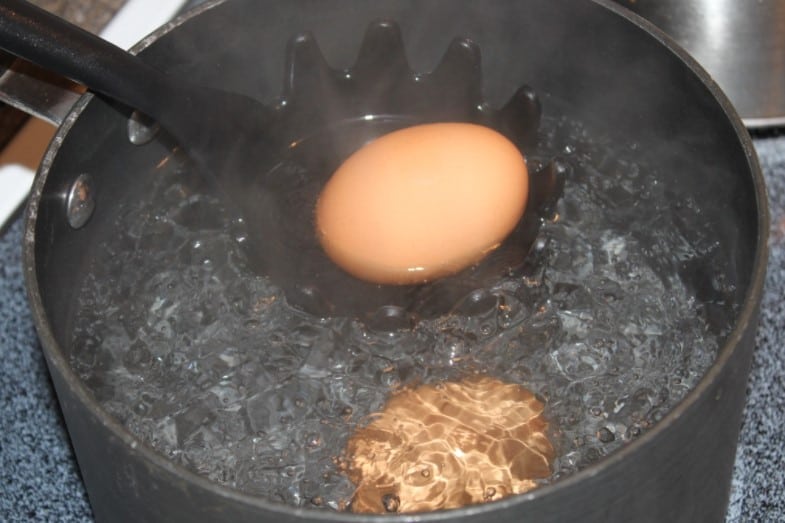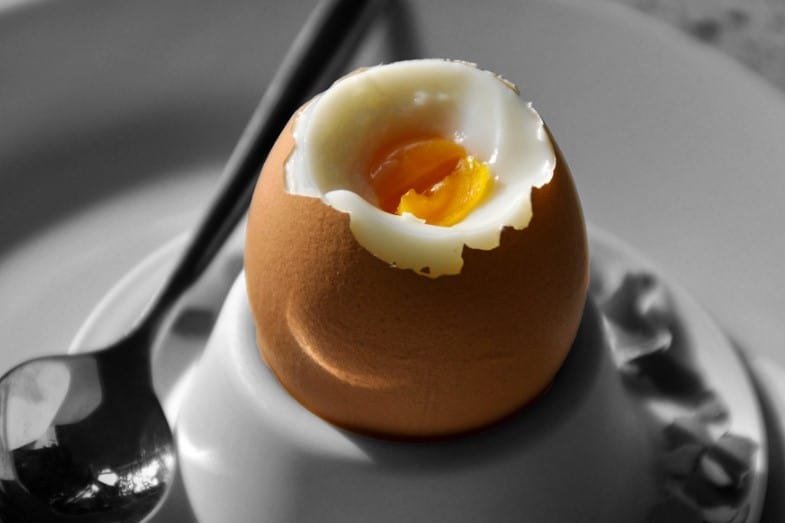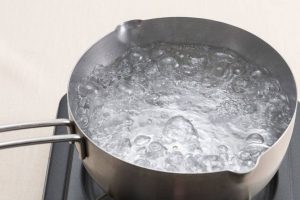How to tell when hard-boiled eggs are done boiling? The trickiest part of boiling an egg is to know when it is done. Thankfully, there are a few ways to ensure your hard-boiled egg comes out perfect each time. In this article, I’ll describe these different methods as well as tips for making the perfect hard-boiled egg.
How to know when boiled eggs are done boiling? To know when a hard-boiled egg is done, you can use any of these 6 methods:
- Spin the Egg
- Shake the Egg
- Hold the Egg Up to the Light
- Use a Thermometer
- Drop the Eggs in Warm Water and Check for Bubbles
- Crack the Shell
The estimated time for boiling an egg is as follows:
- Hard-boiled eggs (solid yolk): 8 minutes
- Medium-boiled eggs (semi-runny, semi-hard yolk): 4.5 minutes
- Soft-boiled eggs (runny yolk): 2 minutes
To stop the cooking process, you should rinse the eggs in cold water immediately. If you don’t, the yolk will continue to harden just from the heat of the egg.
Read on to learn more about how to tell if boiled eggs are done so that they come out perfect every time.
How to Tell When Hard-Boiled Eggs Are Done?
Below are 6 ways to know when a hard-boiled egg is done and perfectly cooked.
1. Spin the Egg
Spinning the egg is an easy and quick way to check if it is done boiling. Put the egg on its side on a flat surface and spin it. Boiled eggs will easily and quickly spin around, but uncooked eggs will wobble at first and then slowly spin. The remaining liquid inside them prevents them from spinning right away.
Here’s how to do this method in detail:
- Put the egg on its side (not on its pointed top or rounded bottom) on a flat and smooth surface. You can use a large chopping block, the top surface of your countertop, or the kitchen sink.
- Hold the egg between your fingers and thumb, and with a sharp twisting motion, spin it quickly just like you are spinning a top. The egg should spin at a steady pace.
- Stop the eggs’ rotation quickly by extending your index finger like you are pointing at the egg. Then quickly put your finger down in the middle of the egg and press on it hard enough. The spinning of the egg should stop. As the egg comes to a stop, quickly remove your finger. In a second or two, the egg will stop rotating.
- Observe the egg and watch what happens. If it stays still, you have a cooked egg. But if it continues to rotate, even at a slow pace, you have an uncooked egg. There’s still some liquid remaining in the shell that causes the egg to continue spinning. The egg’s center of gravity is continually shifting because of the liquid’s continuous movement inside.
What if you have to check so many eggs at once? This is what you need to do:
- Watch how the eggs spin.
- The eggs that are spinning like a top, with steady circular motions, are done boiling. Their centers of gravity are not shifting; that is why their spins are stable.
- The wobbling, slowly spinning, or even difficult to spin eggs are not yet done. They still have liquids remaining inside their shells. These liquids cause the shifting of their centers of gravity, throwing off their balance.
2. Shake the Egg
The next way for how to tell if boiled eggs are done is to gently shake the eggs. Shaking an egg is a very simple and fast method to know if it is done. Hold the egg with your fingertips. Shake it gently like you are shaking a maraca. What do you feel from the egg? If the egg feels very solid, then it is already cooked – perhaps even hard-boiled.
But if you feel there is still some swooshing inside, it is not yet done. What you are sensing is the movement of the remaining liquid inside the uncooked egg. Toss it back to the pan to complete the cooking process.

3. Hold the Egg Up to the Light
The egg’s shell is thin and should let some light pass through it if it is still raw. The yolk will still be visible if it is still uncooked. A boiled egg has solidified all its content, so it should be fully opaque and will not allow light to pass through its shell.
Use a flashlight and light it on the other side of the egg. The egg should be between you and the flashlight, and its light should be shining towards you. Try to look for the yolk by moving the flashlight back and forth. If you can still see traces of the yolk, you have an uncooked egg. But if all you see is a solid background, then you have a fully cooked egg.
4. Use a Thermometer
You can also use a kitchen thermometer if you know the temperature of cooked eggs. Here’s how to do it.
- Remove the egg from the boiling pan with a ladle or spoon. Tip the utensil slightly to remove its water contents.
- Wear an oven mitt and hold the egg. You can’t hold the egg with your bare hands because it is still hot. But you can’t let the egg cool down because you won’t get an accurate thermometer reading.
- Push the sharp end of the thermometer on the shell and into the center of the egg. Let it stay there for a bit until it gives a reading.
- The egg is done boiling if the thermometer reading is 158-170°F (70–77°C). If you get a lower reading, you should toss the egg back to the boiling pan and cook it some more. But if the reading is higher, you have overcooked the egg. Overcooked eggs are still edible, but they are not very pleasant to eat. They are chalky and dry.
5. Drop the Eggs in Warm Water and Check for Bubbles
The next method for how to know when eggs are done boiling is the bubble method. Uncooked eggs will release tiny bubbles of air if you drop them in warm water. As they start to submerge, the tiny pockets of air will escape from the eggshell. If you completely cook an egg, there will be no air pockets in the shell because the cooking process removed them.
Here’s how you can do this method:
- Put the egg(s) in a bowl or pot of very hot water (but not boiling with bubbles).
- Are there small streams of bubbles coming out of the eggshells? If there are, the eggs are still uncooked. Placing the eggs on hot water will cause the air gasses inside them to expand. Eggshells are full of tiny microscopic holes, and expanded gasses will escape through these holes. They will show as streams of tiny bubbles.
Fully cooked eggs will not release small streams of bubbles since the cooking process has already forced them out of the shells.
6. Crack the Shell
How do you know when hard-boiled eggs are done if you are boiling several batches? Crack a sample. In other words, you can check by cracking the shell of one of the eggs. Here’s how you can do it.
- Lift one egg out of the boiling pan. Use a ladle or spoon and not your hands.
- Run it underwater.
- Quickly crack it open.
- Cut the egg in half.
- Examine the yolk.
- If it is already to your liking, it is more than likely that the rest will also be the same.
- If it is not, let them boil for a few more minutes.
Cracking an egg to test it should be the last resort to tell if it is done. If you keep an eye on boiling the eggs, you can be sure that, on average, they will be cooked the way you want them cooked.
If you want to achieve the perfect hard-boiled eggs, you should let them boil for about 8 minutes. But if you only want the consistency of medium-boiled eggs, just boil them for around 4 1/2 minutes. Also, you should immediately stop the cooking process, or you will overcook the eggs.
To stop the cooking process, remove the eggs after the set time from the pan, and rinse them immediately in cold water. Failure to do so will continue the cooking process and will likely overcook the eggs.
You can confirm if the eggs are cooked to your liking if you will crack their shells. Properly cooked hard-boiled eggs will have solid but soft yolks. Medium-boiled eggs cooked correctly will have moist yolks that look similar to custard.
Can you over boil an egg? Yes, you can over boil an egg. If you boil an egg for longer than 10 minutes, it will be very hard, and the shell might crack in the water. If you boil an egg for longer than 30 minutes, it will be very hard, rubbery, and the shell will have cracked. So make sure to set a timer so that you don’t forget about the egg.

We’ve answered the question ‘how to tell when boiled eggs are done?’; next, let’s look at the steps involved in making the perfect hard-boiled eggs.
How Long Does It Take to Boil Eggs? Soft and Hard-Boiled
How to Make Hard-Boiled Eggs
Hard-boiled eggs have many uses. You can add hard-boiled eggs as an ingredient to some dishes to make them more palatable. But, you can also eat hard-boiled eggs as is since they also taste good if done right. So, here is how you can make hard-boiled eggs – the right way.
1. Put the Eggs in a Saucepan with Water
Get a suitable saucepan and fill it with water about one-quarter of the way. If needed, add more water to cover all eggs by 1 to 2 inches of water. The more eggs you need to boil, the more water you should add.
For example, if you are boiling six eggs, you should have them covered by 1 inch of water. If you are boiling 7 to 12 eggs, there should be 2 inches of water covering them.
2. Set the Stove to High Heat
Cover the saucepan and set the stove to high heat. Next, add a teaspoon of vinegar to the water. This technique will help keep the egg whites from bubbling out of the shell if it cracks while cooking.
Add 1/2 teaspoon of salt to help prevent the eggshells from cracking. It will also make the shells easier to peel after cooking. Wait and bring the water to a full rolling boil.
3. Turn off the Heat after 8 Minutes
After 8 minutes, turn the heat off. The actual time will depend on how much you like your eggs boiled. If you want them hard-boiled, stick to 8 minutes. But if you don’t want them to be as hard, don’t go more than 6 to 7 minutes. You can even go for less than 6 minutes if you want.
4. Strain the Water from the Pan
After cooking the eggs to your liking, strain the hot water from the pan.
5. Run Cold Water over the Eggs
While the boiled eggs are still in the pan, put them under the tap and run cold water over the eggs. This will quickly cool the eggs down and stop their cooking process. If you have large batches of newly boiled eggs, you can use a slotted spoon and empty the eggs in a large bowl or container with ice water.
If you are boiling eggs at high altitudes, allow the eggs to sit in hot water a little while longer. Or you can lower the heat of the stove and simmer the eggs for about 6 to 8 minutes. You will not overcook your eggs if you use this method. You should eat boiled eggs within five days.
Instructions for Microwaving Bagel Bites
Conclusion – How to Know When Hard-Boiled Eggs Are Done?
So, to recap, how do you know when eggs are done boiling? To know when a hard-boiled egg is done, you can use any of these 6 methods:
- Spin the Egg
- Shake the Egg
- Hold the Egg Up to the Light
- Use an “Instant-read” Thermometer
- Drop the Eggs in Warm Water and Check for Bubbles
- Crack the Shell
When are hard-boiled eggs done? The estimated time for boiling an egg is as follows:
- Hard-boiled eggs (solid yolk): 8 minutes
- Medium-boiled eggs (semi-runny, semi-hard yolk): 4.5 minutes
- Soft-boiled eggs (runny yolk): 2 minutes
To stop the cooking process, rinse the eggs in cold water immediately. If not, they will get overcooked. The yolk of medium-boiled eggs should only be moist, just like custard, and the yolk of hard-boiled eggs should be a soft solid.
Read next:



